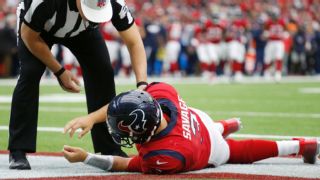|
The NFL's concussion protocol cannot possibly be considered adequate if it allowed Houston Texans quarterback Tom Savage back into Sunday's 26-16 loss to the San Francisco 49ers. The policy has been improved and expanded dramatically in recent years, most recently to include discipline for failure to comply, but clearly it remains lacking in a fundamental way. The image will be seared in our minds for some time. We all saw Savage's helmet slam off the NRG Stadium turf in Houston. He rolled over, his arms bracketed in an apparent display of what's known as the "fencing response." His hands twitched as though he were seizing. Referee John Hussey immediately recognized Savage's distress. According to Texans coach Bill O'Brien, the team's medical staff administered a concussion test when the quarterback reached the sideline. And then, for reasons that will and should be under discussion in the NFL office at this very moment, Savage was cleared and returned to the game for one series. Only when further testing revealed a concussion were the Texans forced to declare Savage out. Aside from its potential impact on Savage's long-term health, here's the biggest problem with that apparent order of events. If it happened that way, and our current evidence suggests that it did, then the Texans didn't violate the NFL concussion policy as I understand it. It's possible for concussion symptoms to be delayed, and we have several examples in recent years of players passing the test at one moment and then failing it later, including in Week 10 with Indianapolis Colts quarterback Jacoby Brissett.  That's the first question the NFL must face as it reviews this policy in the coming weeks and months. Is the test too lenient if Brissett, Savage and others passed it moments after suffering the head trauma that ultimately caused a concussion? Should there be a mandatory waiting period after a hit to the head, one that would guard against the onset of belated symptoms? That's the first question the NFL must face as it reviews this policy in the coming weeks and months. Is the test too lenient if Brissett, Savage and others passed it moments after suffering the head trauma that ultimately caused a concussion? Should there be a mandatory waiting period after a hit to the head, one that would guard against the onset of belated symptoms?
People watching the game on TV often have a better view of what happened during a play than medical officials on either sideline. That's why the NFL has installed two certified athletic trainers in a booth above the field, each with a replay machine and a dedicated radio connection to the sidelines. There is also video equipment on the sideline for team doctors and unaffiliated neurological consultants (UNC) to review the mechanism of the injury. So how could Savage possibly have been sent back into the game when the replay showed obvious concussion symptoms? While the policy provides the equipment, mandatory use of it is less clear. At one point, the policy states: “The sideline medical staff will be able to review the game film on the sidelines to obtain information on particular plays involving possible injury.” At another, it lists video review as part of the initial sideline discussion. It's difficult to imagine that any of the medical personnel who initially tested Savage, at least anyone with a vested interest in his health, saw the replay before clearing him. All O'Brien said was that "the evaluators made the determination to put him back in the game." So, perhaps the NFL should make clear that at least one medical official is required to view the replay to ensure nothing has been missed before any player can be cleared. Such a requirement could delay the return of some healthy players, which could perhaps impact the competitive balance of the game. But as we discussed last week, the NFL and its players have given fans too many opportunities this season to question their commitment to brain health. Now is not the time, and really there isn't a good time at all, to prioritize competition over head trauma. Two years ago, the league installed a discipline schedule for teams that don't follow the protocol. I'm sure the Texans need to explain what happened to the league's medical staff, starting with chief medical officer Dr. Allen Sills. There is a maximum of a $150,000 fine to the club on first offense of a documented violation. I'm not sure how quickly we'll learn the answers. As of Sunday night, the league had not announced the results of its investigation into the Seattle Seahawks' apparent failure to subject quarterback Russell Wilson to an immediate test during a Week 10 game against the Cardinals. But let's be clear: At the heart of the concussion policy is the credibility of the NFL's commitment to brain health, especially -- but not exclusively -- when you have a player exhibiting the sickening symptoms that Savage did. If a player can be in that position one moment, then back behind center at another, the policy isn't good enough.
|

